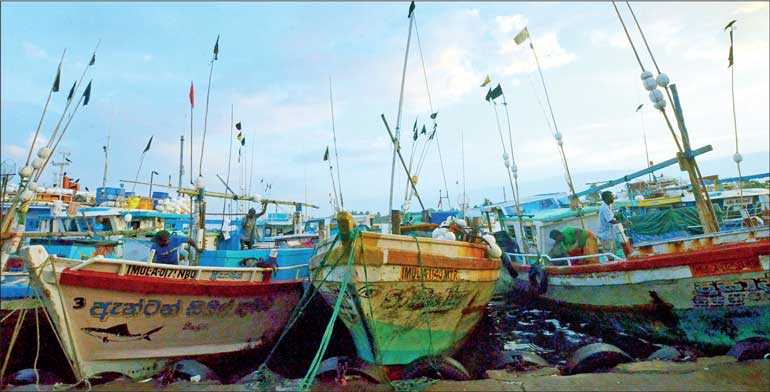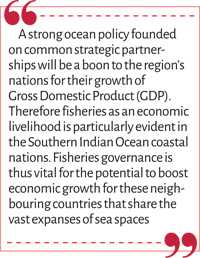Tuesday Feb 24, 2026
Tuesday Feb 24, 2026
Saturday, 3 October 2020 00:02 - - {{hitsCtrl.values.hits}}

In Sri Lanka, over 2.7 million fishermen from 15 coastal regions rely upon fisheries for their livelihood. They add to a yearly assessed fish catch of 530,920 metric tons accounting for 1.3% of the country’s Gross Domestic Product (GDP). Total number of working fishing boats in year 2016 was accounted for over 60,000 – Pic by Shehan Gunasekara
 The Indian Ocean provides a dependency for its Island and coastal nations on their economic and commercial prosperity. Deep sea fishing policies in South Indian Ocean fisheries nations offer excellent scope with more than 20 million population of the Indian subcontinent neighbourhood like Sri Lanka and Maldives along with India’s coastal states.
The Indian Ocean provides a dependency for its Island and coastal nations on their economic and commercial prosperity. Deep sea fishing policies in South Indian Ocean fisheries nations offer excellent scope with more than 20 million population of the Indian subcontinent neighbourhood like Sri Lanka and Maldives along with India’s coastal states.
A strong ocean policy founded on common strategic partnerships will be a boon to the region’s nations for their growth of Gross Domestic Product (GDP). Therefore fisheries as an economic livelihood is particularly evident in the Southern Indian Ocean coastal nations. Fisheries governance is thus vital for the potential to boost economic growth for these neighbouring countries that share the vast expanses of sea spaces.
India’s National Fisheries Policy
The waters of the Arabian Sea and the Bay of Bengal meet in Kanyakumari, a small coastal city in the southern tip of the country. Its geographic location provides access to squander sea assets in the Gulf of Mannar and Palk Bay territory. In this way, on a more central level, Indian Blue Economy Vision of 2025 will bridle the interest for sea-food consumption in the years to come.
These people-centric ocean policies will especially benefit India’s 14 coastal states – Tamil Nadu, Kerala, Gujarat, Andhra Pradesh, the islands of Lakshadweep, Andaman and Nicobar, and the many other villages that depend on fisheries-related activities.
At present it is an ideal opportunity to reflect and amend the National Fisheries Policy as it is a source of livelihood for more than 20 million fishermen and fish ranchers. This sector contributes Indian Rupees 1.75 trillion every year to the national GDP.
Fisheries advancement in Sri Lanka
In the course of recent decades Sri Lanka’s fisheries policy initiatives has fortified its emphasis on Ocean resources management. As a procedure for fisheries advancement in Sri Lanka’s Exclusive Economic Zone (EEZ), a Five-Year Fishery Development Plan was dispatched in 1979, pointed towards expanding fish production and raising the income of coastal fisherman.
In Sri Lanka, over 2.7 million fishermen from 15 coastal regions rely upon fisheries for their livelihood. They add to a yearly assessed fish catch of 530,920 metric tons accounting for 1.3% of the country’s Gross Domestic Product (GDP). Total number of working fishing boats in year 2016 was accounted for over 60,000.
There is ample scope of increasing production by wandering into more profound waters of the EEZ, which holds a capability of increasing of many folds in fisheries harnessing capacities. Sri Lanka needs to further undertake scientific research and studies of special oceanographic features of the Indian Ocean for the benefit of this sector.
Fisheries advancement in the Maldives
Historically Maldivian fisheries which contribute 11% to the GDP of the island’s economy (FAO) is the second biggest industry in the island country. Statistics reveal that Maldives has an annual fish catch over 48,399 metric tons. The reasons for the increase in fish harvest are due to its geographical setting in the Indian Ocean and the mechanisation of the traditional sailing boats in the mid-70s.
Hence the Maldives Industrial Fisheries Company (MIFCO) plays a vital part in the island nations’ fisheries improvements. Taking the Maldivian national fisheries plans forward the Maldives Industrial Fishing Corporation (MIFCO) standardised the export oriented fisheries products.
Laws and regulations on the ocean
The allowable framework administering uses of the sea by individual states was classified in the United Nations Convention on the Law of the Sea (UNCLOS) in 1982 and UN Fish Stocks Agreement in 1999. The consolidated EEZ of the three neighbouring nations, India, Sri Lanka and the Maldives, could be roughly 3.887 million sq. km. Consequently, each costal state’s regional ocean limit is 200 nautical miles from its gauge known as the Exclusive Economic Zone (EEZ).
Glancing back at probably the most remarkable treaties signed by the neighbouring nations, the 1974 and 1976 arrangements delineating the International Maritime Boundary Line (IMBL) between Sri Lanka and India was one of the huge discretionary grinders that reshaped India’s sea strategy with its southern neighbours. Lately, a prominent fisheries agreement for India was the Southern Indian Ocean Fisheries Agreement (SIOFA) marked in mid-2006 and upheld in 2012.
Fisheries: India and Southern Littoral States
The Indian subcontinent neighbourhood like Sri Lanka and Maldives has the most heavily utilised and impacted coastal region in the South. The neighbouring Southern
Indian Ocean littoral states along with the Indian coastal states must purse a strong ocean policy based on common strategic interests.
This could be a step in shaping the direction for a fisheries governance framework in the Southern Indian Ocean. Hence binding this diplomacy between India, Sri Lanka and the Maldives thereby helps in securing a common fisheries policy for India and the littoral states.
[Dr. Srimal Fernando is a recipient of the prestigious O.P Jindal Doctoral Fellowship and the SAU Scholarship under the SAARC umbrella. He is an Advisor/Global Editor of Diplomatic Society for South Africa in partnership with Diplomatic World Institute (Brussels). He is also the winner of the 2018/2019 ‘Best Journalist of the Year’ award in South Africa, and has been the recipient of Global Communication Association (GCA) Media Award for 2016. In 2019 Dr Fernando was an Indian Council of World Affairs (ICWA) accolade recipient.]
[Vedangshi Roy Choudhuri is pursuing a Bachelor of Arts (BAhons.) in Journalism and Mass Communication at the Jindal School of Journalism & Communication (JSJC). She mainly focuses on Indo-China global media relations. She was also a recipient of the ICASQCC Gold Medal in Mauritius. Roy is member of the SGRC at Jindal Global University and a social activist in Chennai.]